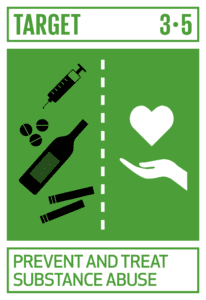FORUT – the Norwegian IOGT Movement’s Development Agency – Launched New Report on Alcohol’s Impact on Women’s and Children’s Rights
The IOGT movement in Norway is campaigning against the Norwegian Oil Fund’s investment in the alcohol industry and has released a new report detailing how alcohol impacts the rights of children and women in the global south.
The campaign called “Oil Fund’s Alcohol Problem” is run by FORUT, IOGT Norway, Juvente and Blue Cross Norway.
Norway: IOGT Movement Campaigns against Pension Fund’s Alcohol Investments
The new report was written by experts at the Center for Alcohol Policy Research and La Trobe University, Melbourne Australia.
Vi har lansert en ny rapport om alkoholens påvirkning på kvinner og barns rettigheter – rapporten viser blant annet hvordan andre menneskers, ofte en manns, drikking påvirker folkene rundt seg og skrenker inn muligheter for andre https://t.co/CLEQHjQosc pic.twitter.com/LDYdmGbsIO
— Oljefondets alkoholproblem (@SPUalkoprob) November 26, 2019
Report summary
The report aims to increase understanding of the effects of alcohol on women and children in the Global South. The scope of the report includes harms from one’s own and others’ alcohol use and seeks to identify the types of health and social harms experienced by women and children (including adolescent children), and the ways in which one’s own alcohol consumption and others’ alcohol use impact upon women’s and children’s rights to health, wellbeing, safety and their potential for development.
The focus of this report is to identify:
- Impacts of one’s own and others’ alcohol use on the wellbeing and quality of life of women and children,
- Impact of alcohol use on educational outcomes for women and children
- Harms to women’s physical and mental health due to their own and others’ alcohol use,
- Violence against women and children due to others’ alcohol use.
The review report explores a number of themes or sub-groupings of harm:
- Harms to women;
- Harms to adolescents;
- Harms to children;
- Harms to families;
- Intimate partner and gender-based violence;
- The impact of alcohol use (own or others’ alcohol consumption) on HIV AIDS;
- Traffic deaths and injuries; and
- Miscellaneous social harms, e.g., initiating sex work to pay for alcohol, stigma, urbanization and community impacts.
The range of ways in which women and children may be affected by alcohol are manifold and the magnitude and severity of this harm vary substantially across the world. Attention in this report is directed to harms which have the potential to impact on the health and human rights of women and children.
Accordingly, the preamble of the United Nation’s Universal Declaration on Human Rights is crucial. It states that human beings shall enjoy freedom of speech and belief and freedom from fear and want. Regarding equality of human rights, it adds:
All human beings are born free and equal in dignity and rights” and that “everyone is entitled to all the rights and freedoms set forth in this Declaration, without distinction of any kind, such as race, colour, sex, language, religion, political or other opinion, national or social origin, property, birth or other status…”.
The United Nations’ Convention on the Rights of the Child also crucially spells out the basic human rights that children have everywhere:
the right to survival; to develop to the fullest; to protection from harmful influences, abuse and exploitation; and to participate fully in family, cultural and social life”.
In a variety of ways, one’s own alcohol use and others’ alcohol consumption may impact upon the rights of women and children, particularly where the safety of women and children is threatened, and the development of children may be compromised.
Alcohol has the potential to affect oneself and others, including in parenting, relationships, family and community life.
Alcohol obstacle to development
IOGT International has previously identified how alcohol impacts the Sustainable Development Goals, finding that 14 of 17 SDGs are adversely affected, including all dimensions of development.
Alcohol is a major obstacle to sustainable human development, adversely affecting all three dimensions of development and reaching into all aspects of society. It is jeopardizing human capital, undermining economic productivity, destroying the social fabric and burdening health systems.
Through its multiple health, social and economic harms, alcohol is a massive obstacle to sustainable human development.
Alcohol adversely affects 14 out of 17 SDGs and a total of 54 targets.
 Alcohol is specifically mentioned in SDG 3 on health and well- being.
Alcohol is specifically mentioned in SDG 3 on health and well- being.
Target 3.5 reads:
Strengthen the prevention and treatment of substance abuse, including narcotic drug abuse and harmful use of alcohol
Evidence shows that alcohol is a cross-cutting risk factor in many areas of the 2030 Agenda, such as:
Eradicating poverty; Ending hunger; Ensuring healthy lives for all; Ensuring quality education; Achieving gender equality; Ensuring drinking water for all; Promoting decent work and inclusive, sustainable economic growth for all; Reducing inequalities; Making cities safe and inclusive; Ensuring sustainable consumption; Combating climate change; Protecting terrestrial ecosystems; Promoting peaceful and inclusive societies; and Revitalizing the global partnership for the SDGs.
—